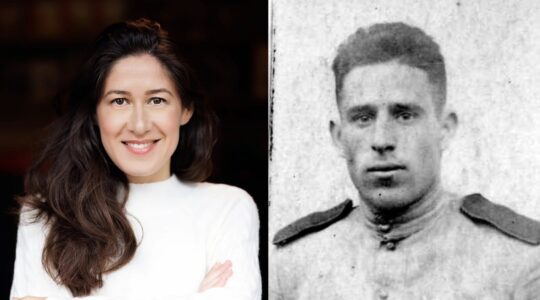Kleinmachnow, Germany: Ron Brown suddenly became nervous. The Reform rabbi from Merrick, L.I., for weeks had been pondering how his delegation of 11 American rabbis should dialogue with a classroom of German teenaged students over such hot-button topics as the Holocaust, the state of anti-Semitism today, Israel and now the looming American invasion of Iraq.
Rabbi Brown had anticipated pointed questions from the 18- and 19-year-olds: What about America’s seeming push to war in Iraq while the rest of the world, including Germany, disagrees? Why is Israel being so brutal to the Palestinians?
Believing that the students had never met a rabbi before, he considered these potential questions and already formulated several careful responses.
So Rabbi Brown felt prepared last week when he and two colleagues (Rabbi Yitzchak Cohen, an Orthodox rabbi from Dallas, Texas, and Rabbi Paulette Gross, assistant at the Conservative Park Avenue synagogue in Manhattan) entered Weinberg Gymnasium, the clean, neat schoolhouse for ambitious seventh- to 13th-graders surrounded by woods in this village in the former East Germany.
But minutes before the rabbis were slated to meet the students, school principal Frau Lesemann unknowingly dropped a bombshell: The students had never met a Jew before, let alone a rabbi.
"I suddenly felt an awesome burden," Rabbi Brown confided later. "This is first contact. I never get nervous before speaking, but how we came across would either confirm stereotypes or break stereotypes of Jews. Someone would make a decision about Jews based on us."
The rabbis took their seats in front of a green chalkboard in the beige and white classroom, whose walls were conspicuously bare.
Initial tension was broken quickly when Rabbi Cohen, a short, round former cantor and Yiddish theater star with a Jackie Mason-like accent, cracked a joke. He humorously tried to explain the differences between the Jewish denominations.
From there the atmosphere slowly warmed, as the fresh-faced students (clad like their American counterparts in jeans, sweaters or sweatshirts) politely asked questions about the Holocaust, the dangers of living in Israel, the Bush administration policy in Iraq and the existence of women rabbis.
The meeting came as tensions against Jews are rising in Germany, confirmed by The Jewish Week during interviews with German government officials, Jewish community leaders and secular Muslim leaders. They cited a complex menu of the continuing violence between Israel and the Palestinians, post-Sept. 11 anxiety and a growing radical Arab Muslim immigrant community in Germany.
"No one wants to talk about it, but it seems to be getting worse," said one high-level official in the foreign ministry.
But there was no such anxiety in this East German classroom, where only one of the 19 students raised their hand when asked if they had ever met a Jew.
And although they had not met a Jew face to face, the students seemed quite familiar with Jewish issues.
The first question, from a young man, was about the plight of Israelis living in Jerusalem in the face of suicide bombings.
"Isn’t it dangerous, aren’t you afraid?" he asked.
"Life is dangerous," replied Rabbi Cohen, whose daughter lives in Jerusalem, "and has no intentions of leaving."
Another student asked the rabbis, "What kind of feelings do you have coming to Germany because of all the terrible things that happened to the Jewish people here?"
Rabbi Brown said his father raised him in the early 1950s not to buy any German products, but after meeting some German exchange students several years ago, he slowly realized he could not hold them responsible for what their grandparents might have done.
Rabbi Cohen, whose rabbi father was a Holocaust survivor, told the students: "I made a vow never to set foot on this land soaked with the blood of my people."
But, he added, "this is the first time I came to Germany and I have to tell you I am changing my mind. Can I truly prosecute a new generation?"
Rabbi Gross, 30, said she also was raised not to buy German goods, but during her visit, cosponsored by the German government-funded group Bridge of Understanding, she began re-evaluating her childhood instructions.
"I’m trying to put history into perspective," she said.
The New York Jewish Week brings you the stories behind the headlines, keeping you connected to Jewish life in New York. Help sustain the reporting you trust by donating today.




